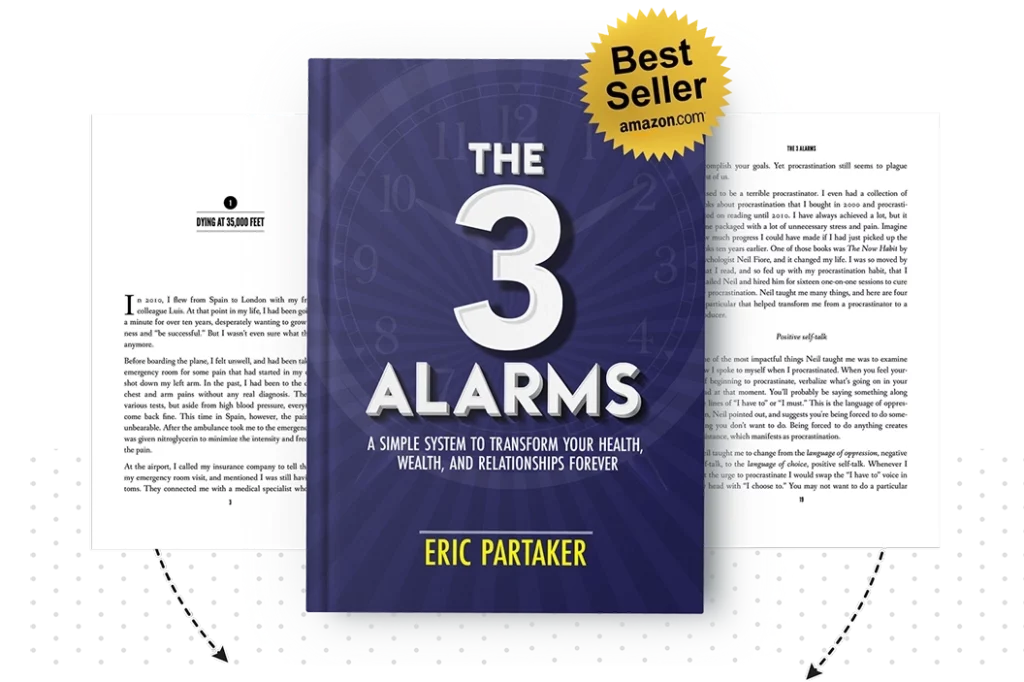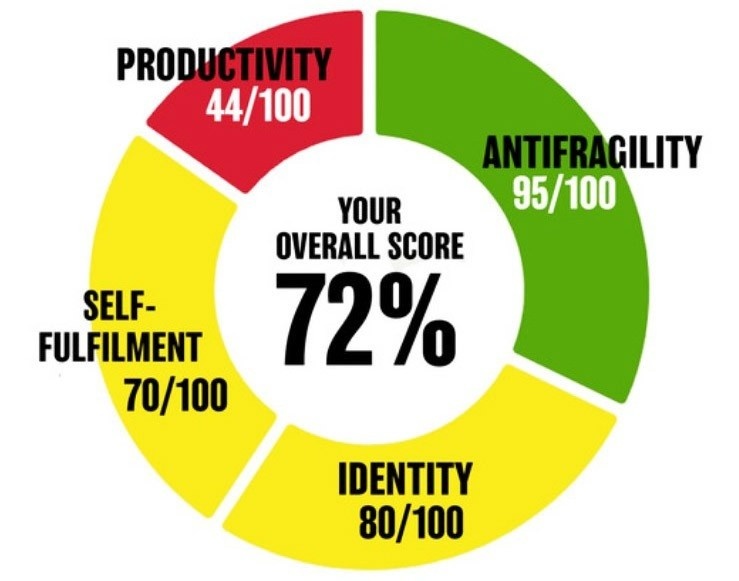SUMMARY
- I’ve always struggled to maintain balance between the three pillars of my life – work, health and relationships. I was the type of person who would go all-in on work and have bouts of success but then suddenly I’d have some kind of health issue or relationship problem.
- The way I’ve managed to improve in all areas, without sacrificing any of them is by introducing a peak performance routine. There are 5 components of this: 1) 8 hours of sleep 2) 90 minutes of deep work by 7:30 am 3) Daily exercise by 9:00 am 4) Shutdown work at 7:30pm 5) Digital sunset at 8:30pm
- The most important of all of these is 8 hours sleep. The truth is, if you don’t prioritise your sleep, you’re not going to be able to perform at a high level in the long run. You may be able to survive but you definitely won’t thrive.
- Getting deep work in first thing allows me to focus on whatever is most important and start the day off with a win. I can then mix in my exercise after as a reward for finishing the most important task I’ve just completed.
- In the evening I end my day with a shutdown ritual to separate my work and home life and prepare for the next day before switching off all devices so that I can ensure the best quality sleep possible.
TRANSCRIPT
Today, I want to share with you a really simple routine that I use to maintain a super high volume of output and peak performance in my life. And I don’t just mean peak performance at work. I also mean performing at my highest level, both on the health front and the home fronts as well, because if we really want to close that gap between who we are and who we are capable of being, we have to respect that it’s not just pedal to the metal on the work front. It’s also the health and the home front, or the relationship front, however you want to refer to it. But it’s about really maximizing those three pillars.
Now, this is something I have really struggled with for a long time. I was the type of person who would go all-in on work. I’d have bouts of success. Things seemed to be going well. And then suddenly I’d have some kind of health issue. I’d get really, really sick or suddenly I’m feeling palpitations or something in my heart and something doesn’t feel right or I’m feeling anxious or down. And I’m equally, suddenly on the home front. You know, I was hearing the kids say, “Hey, we don’t see you. You know, we want to play with you”. And my wife was saying the same thing. And I wasn’t spending enough time with them. Have you ever felt that you’re giving it your all at work, but you’re feeling down about your health?
Maybe you’re giving it your all, but you’re not happy with what you see in the mirror. You’re feeling sluggish, your energy’s low. You’re out of weight, you’re out of shape. You also feel a bit down about maybe not being present and available at home. Have you ever felt guilty for the amount of work that you’re doing? These are all things that I felt, and these are all things that I’ve had a very, very conscious work on to make sure that I was improving. And I want to take you today through not necessarily what you should do, everyone’s unique, but I’m just going to share what I’m doing. And if it sounds like it might work for you, you might want to develop or mirror this peak performance flow and collect your own data. See what helps you operate at a higher level.
I have five key metrics that I measure myself against on a daily basis to make sure that I’m optimized in all areas of my life. The number one metric that I’m doing my best to maintain is eight hours of sleep. Now, you may think that I don’t need eight hours of sleep. I’m this high performing entrepreneur, or I have this gene that allows me to survive with less than eight hours of sleep. So if you think you’re that high performer that needs less than eight hours of sleep, then you’ve probably just become accustomed to operating at a lower baseline. Or if you think that you can survive with less than eight hours of sleep, guess what: you’re exactly right. You can survive, but that’s not the point. It’s not about surviving. We do thrive with more and by the way, your chance of having the gene – cause there’s a gene associated with being able to thrive on less than eight hours of sleep – your chance of having that gene is equivalent to your chance of being struck by lightning.
And if you want to read more about this subject and some of this data, in fact, read the book, Why We Sleep by Matthew Walker. The first thing that I seek to protect are those eight hours of sleep, because I can’t perform at a high level unless I’m feeling rested; restored. And when you go through your workday, do you feel sluggish at times? Do you feel like things get hazy and cloudy and you start to lose your focus and you’re suddenly procrastinated and suddenly I’m on Facebook and I’m checking out the feeds of my friends? And then I’m thinking that it’s sitting with regret – I should have been working on this presentation.
Have you felt like that before? I’m wondering how that’s connected to your sleep. Are you getting enough sleep? Are you getting eight hours every single day? That’s the first thing that I protect in my peak performance routine, eight hours of sleep. The second thing is I like to start my day off with a massive win in terms of some deep work before I’m off and running for the rest of the day. And so the second thing that I seek to manage is 90 minutes of deep work before I start my day early.
I don’t want this to shock you. I tried to do 90 minutes of deep work before 7:30 AM. Yes. That means I’m starting at 6:00 AM working from 6:00 AM to 7:30 AM, but you also have to take into account that I’m going to bed earlier. I’m asleep by 9:00 PM, 9:30 PM. So I’m still getting my eight hours of sleep. What do I mean by deep work? I mean, just working in an intense state, distraction-free, where you only work on one particular task for those 90 minutes.
I find that when I work in a state of deep work; when I do that before the rest of the day starts; before the rest of the family wakes up; before the emails start coming in or the meetings start; I feel like my days in a win already, and I’ve already accomplished so much and no matter what happens after that point, I just feel like I’m winning now.
The third thing that I add into the mix is exercise, but I like to do that after I’ve kind of earned that break. And you might be thinking, earn exercise, earn a break. That doesn’t sound like a break to me. Well, when you get into a peak performance routine, you start to realize that generating energy generates peak performance rather than requires it. I like to do my exercise by 8:30 AM.
So this is a routine that works for me. And that could just be 20 minutes. It could be 60 minutes, but it’s right after that deep workflow. Now all of these times that I’m using here, all this is completely adjustable. With the exception of sleep, you need eight hours of sleep, but you may just want to try 30 minutes of super focused, deep work before the rest of your day begins. Maybe just 30 minutes of exercise would work for you. And maybe at different times, maybe a different peak performance routine would work for you. I’m just sharing what I have found to allow me to produce at a very, very high level consistently. So eight hours of sleep, we got our 90 minutes of deep work before 7:30 AM. We have an exercise by 8:30 AM, and by exercise, I don’t just mean the body. I also mean the mind. So what I mean by that is that some days I don’t do physical exercise, sometimes I’ll just do maybe a longer meditation, or visualization work and really work on the mind, not just the body.
Then the workday happens and I continue to work from one project to the next, and I get to the end of the day with a shutdown ritual. So I properly shut down my day so that I can disconnect from that day, go into the evening, properly connect, be present, and available with my family, knowing that I’ve looked at everything that was happening in the day.
I can now focus on the evening, and the next day, and my shutdown routine. So let’s say you’d like your day to end at 6:00 PM. What I would advise you to do is at 5:30, you have a shutdown appointment in your calendar. And in the meeting description of that appointment, I have a simple five-point checklist and it just says, “Update my to-do list with any action items from the day; do a final email check; look at my calendar for the next day; choose my top three items that I’m going to work on for the day ahead; and then drop those top three things like appointments, as little blocks of time in the calendar of my next day”. So I know exactly what I’m going to be working on.
When this allows me to properly transition into the evening, why is this important? Well, this is so that I can properly connect with my family; so I can properly rejuvenate. So I’m not constantly thinking about work – I’ve checked everything now. And so I can sleep better, right? Not thinking about work and knowing I know exactly what I’m going to be doing the next day.
The last powerful routine that I have as part of my peak performance routine is a digital sunset. And what I mean by that is 60 minutes before I go to bed before I’d like to be asleep, I practice what’s called a digital sunset, where I shut off all the electronics in the household, because the issue with any blue light coming from your electronic devices in the evening, such as your telephone or television, is that it’s going to lower the melatonin production in your brain by 50%.
If it’s happening in that hour before bedtime and with less melatonin, melatonin is needed to sleep deeply. It’s the substance that your body creates and releases to say, okay, it’s time to shut down. And without the hundred percent of the melatonin that we need, we’re not going to sleep as deeply or restoratively. So that digital sunset is a reminder for me to make sure that all those blue light-emitting devices are shut off and it allows me to sleep more properly and get that eight hours of sleep.
Those are the five points that I monitor and manage myself against to create a peak performance flow in my day – make sure I have eight hours of sleep, completing a certain amount of deep work by a certain time in the morning, making sure I’m getting my morning exercise, making sure that I’m shutting down my day at the proper time, and then making sure that I have a digital sunset to protect that eight hours of sleep.




